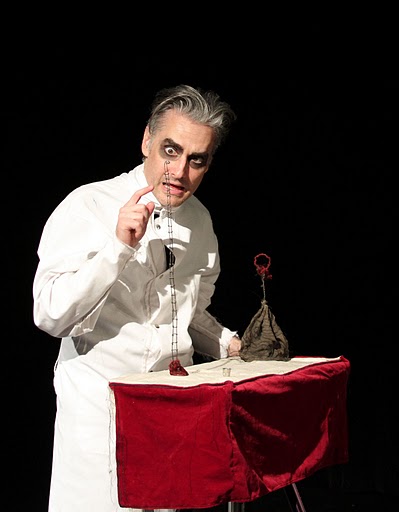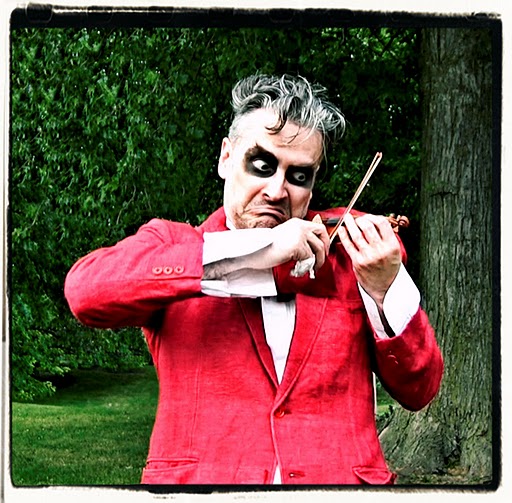
Joe Mazza in The Hyperbolist (Photo by Susan Ask)
As you enter The Red Room, the small black box theater space upstairs from KGB Bar, to attend The Hyperbolist, don’t be surprised to find performer/auteur Joe Mazza already there waiting to personally greet you. His is an undeniable presence, crackling with the energy of the irrepressible performer, eager to shake hands, quip with you, and generally impress upon you the aura of his creative, irrefutable me-ness. You could feel him across a room even if he wasn’t so striking, and there’d be no need for the trappings of theatrical finesse – the black clothes, dark-framed glasses, and black eye make-up – if he wasn’t, in a moment, about to launch a complex, engrossing, and delightful attack upon your jaded audience senses.
 Billed as a grandiloquent farce of tiny proportion, The Hyperbolist presents a sequence of individually contained, related pieces – live performance, video clips, and puppetry – that revolve around the question of how, precisely, we might define that most vexing of human preoccupations, Love. Mazza’s theatrical persona is skilled in the art of high oratory, charismatic radiance, disdainful humor, and good old-fashioned bombast. He is three parts carnival barker, to one part Prospero, one part Rilke. But you do need to sit up and pay attention because the language here, flowing rapidly from pronouncement to accusation, moves at a fine clip, as quickly as any cattle auctioneer’s patter anticipating the fall of the hammer.
Billed as a grandiloquent farce of tiny proportion, The Hyperbolist presents a sequence of individually contained, related pieces – live performance, video clips, and puppetry – that revolve around the question of how, precisely, we might define that most vexing of human preoccupations, Love. Mazza’s theatrical persona is skilled in the art of high oratory, charismatic radiance, disdainful humor, and good old-fashioned bombast. He is three parts carnival barker, to one part Prospero, one part Rilke. But you do need to sit up and pay attention because the language here, flowing rapidly from pronouncement to accusation, moves at a fine clip, as quickly as any cattle auctioneer’s patter anticipating the fall of the hammer.
Mazza’s speech may course in a verbal deluge, but it is rich with poetic nuance and arresting imagery. In one swift throw-aside we are told love can vanish as quickly as color leaving a corpse, and it is just one thread of hyperbole jockeying for place in a single skein of exposition. There is no time to alight on these individual flourishes, as the action proceeds at full tilt.
The interspersed video sequences, projected on an almost cinema-scale retractable screen (Mazza artfully blends it into the staging) are less taxing to follow, unfolding at a gentler, old world, if staccato pace. With music, vintage and contemporary, they present a Chaplin-esque figure (Mazza) isolated by his own sensitivity, at sea in the big city amidst meat-vendors and sexy advertising displays (is he equating the two?), and as an obsessive performer straining after perfection on a miniature violin, while disdaining his listeners and granting Love, standing at the sidelines, a perfunctory nod before returning to his self-absorbing art.
The apparent vintage naiveté of the speechless film pieces is a nice counterpoint to the lofty verbal configurations indulged in by the performer and some of his puppet characters. They stand almost in mockery of these other episodes of affected, high-seriousness. A serious artfulness, however, is everywhere here; in the sensitively modeled and deployed puppets – loose amalgamations of tatters and thread; the poorly stitched costumes that both insist on and undermine their illusionistic role; the craftily botched, improvised props that condense the history of modern theatrical modes – realism to minimalism to poetic illusionism. Nothing escapes the gimlet eye of Mazza the theater artist. All is dense with meaning, even if meaning, in the guise of Love, is held in high suspicion.
Mazza suggests this production is “best enjoyed by the bitter, but hopeful cynic.” Begun as a philosophical quest, the pieces lean toward the suggestion that a reasonable apprehension of love is finally impossible, is self-defeating as an undertaking.
Vivisection and Catholicism are themes woven into the mélange. In vivisection we have an inhumane practice undertaken for humane purposes. In Catholicism we have a savior who dies in the name of love, leaving a creed that insists on suffering and mortification.
Is love, finally, another great conceit? That selfish impulse that drives us toward a necessary self-undoing? Not for nothing are Mazza’s puppets rendered as incomplete beings, variously lacking eyes, vocal chords, sex organs. It seems we don’t really have all the requisite faculties to answer the question.
In the final act, a deliciously realized flea circus, an obsessive, half-cracked scientist means to finally determine the exact substance of love in a wholly scientific manner. When his performing flea assistants (astute observers will note that they can not be seen from the auditorium) finally conjoin in a demonstration of the act, our flint-minded scientist is reduced to putty, and all words fail.
Like a well-made cocktail, a skillful blend of various potent elements, this entertainment will slide down easily, refreshingly, but upon digestion, can deliver one hell of a kick. Frankly, amazing.
~~~
The Hyperbolist Presented by Joe Mazza Chicago, IL The Red Room (85 East 4th Street) $15 Thu 2/24 @ 11pm, Sat 2/26 @ 5pm, Sun 2/27 @ 2pm, Wed 3/2 @ 9:30pm, Fri 3/4 @ 6:30pm, & Sun 3/6 @ 5pmFRIGID New York Festival 2011 will run February 23-March 6 at The Kraine Theater & The Red Room (85 East 4th Street between 2nd Ave and Bowery) and UNDER St. Marks (94 St. Marks Place between 1sr Ave and Ave A). Tickets ($10-$16) may be purchased online at www.FRIGIDnewyork.info or by calling Smarttix at 212-868-4444. All shows will run 60 minutes long or less.



{ 2 comments… read them below or add one }
I am thoroughly enjoying Geoffrey Paddy Johnson’s writing/reviews. Keep em comin……….
Thanks for writing in! We couldn’t agree more – here’s hoping to more guest posts . . . and maybe we can convince Geoffrey Paddy Johnson to make The Happiest Medium one of his homes. We’d be honored to have him!